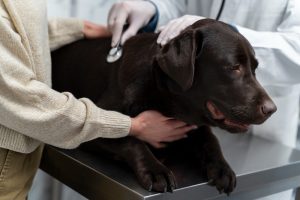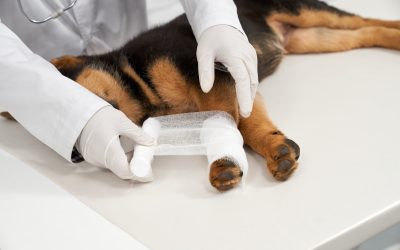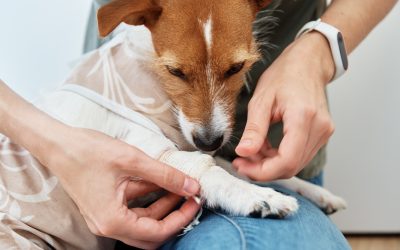IBD (Inflammatory Bowel Disease) in Dogs

Update November 14, 2025
Imagine your usually energetic dog starts having bouts of diarrhea and vomiting. At first, you think it’s just a stomach bug, but when the symptoms persist, you decide to visit the vet. After a series of tests, you receive some concerning news: Your dog has Inflammatory Bowel Disease (IBD). The vet explains that this chronic condition will require ongoing management to keep your dog comfortable. Naturally, you’re worried—what does this mean for your dog’s future? How long will they be with you, and what impact will it have on their quality of life?
Inflammatory Bowel Disease (IBD) is a complex and often unpredictable condition that affects a dog’s gastrointestinal tract, leading to chronic inflammation, discomfort, and a range of symptoms that can significantly impact their well-being. While IBD can be managed with the right treatment, it’s a lifelong condition that requires careful monitoring and adjustments to ensure your dog remains as healthy and happy as possible.
In this blog, we’ll explore what IBD means for your dog’s life expectancy, delve into the stages of the disease, discuss potential complications, and provide guidance on managing the condition effectively to give your furry friend the best possible quality of life.
What Causes IBD In Dogs?
The exact causes of IBD in dogs are not entirely known, but several factors are believed to contribute to its development:
- Genetic predisposition: Some breeds, like German Shepherds and Rottweilers, may be more prone to IBD due to their genes.
- Immune system dysfunction: An abnormal immune response to some food proteins or gut bacteria can cause inflammation, which damages the gut lining.
- Dietary factors: Some dogs are sensitive to certain dog food ingredients, like grains, dairy, or specific proteins.
- Environmental factors: Toxins, stress, and infections can cause IBD in some dogs.
- Bacterial overgrowth: An imbalance in the gut microbiome can cause harmful bacteria to overgrow.
Symptoms and Diagnosis of IBD In Dogs
The symptoms of IBD in dogs can vary depending on the severity and location of the inflammation. Some common signs include:
- Chronic or intermittent diarrhea (sometimes with blood or mucus)
- Vomiting
- Weight loss
- Decreased appetite
- Abdominal pain or discomfort
- Lethargy or fatigue
IBD can be hard to diagnose. These symptoms may also indicate other gut diseases. Veterinarians usually run tests to rule out other causes and confirm an IBD diagnosis. These tests may include:
- Complete blood count (CBC) and serum biochemistry profile
- Fecal examination for parasites or other abnormalities
- Abdominal ultrasound or endoscopy
- Intestinal biopsies
Complete Blood Count (CBC) and Serum Biochemistry
- What It Is: The CBC part checks your pet’s red and white blood cells, along with platelets. This tells the vet if there are infections, inflammation, or something more serious like cancer. The serum biochemistry part looks at things like enzymes and proteins in the blood, which helps check how the liver, kidneys, and other organs are doing.
- How It Works: They’ll take a blood sample, usually from the leg or neck. It’s quick, and results usually come back in a day or two.
- Costs:
- CBC: Around $50 to $100
- Biochemistry Panel: $70 to $200
- Combo of Both: $100 to $300
Fecal Examination
- What It Is: This test will check your pet’s poop for parasites like worms or other bugs that could be causing issues. They can also spot things like blood or weird bacteria levels that might suggest digestive problems.
- How It Works: You either collect a stool sample at home, or the vet will do it for you. The sample gets examined under a microscope or sent to a lab for more detailed testing.
Abdominal Ultrasound or Endoscopy
- What It Is:
- Ultrasound: This is a non-invasive scan that gives the vet a good look at your pet’s internal organs, like the liver, kidneys, and intestines. It helps spot things like tumors or blockages.
- Endoscopy: This one’s more hands-on. They use a flexible tube with a camera to get a direct look at the inside of the GI tract. The vet can even take tissue samples while they’re at it.
- How It Works:
- Ultrasound: The vet will rub a probe on your pet’s belly, kind of like a pregnancy ultrasound, to get images. Sedation might be needed to keep your pet calm.
- Endoscopy: This is more invasive and usually requires anesthesia. The vet inserts the endoscope through the mouth or rectum to check out the GI tract and maybe grab some biopsies.
Intestinal Biopsies
- What It Is: Biopsies are small tissue samples taken from the intestines to check for diseases like inflammatory bowel disease (IBD), cancer, or infections. Depending on the situation, they can be done via endoscopy or through surgery.
- How It Works:
- Endoscopic Biopsies: These are less invasive and done during the endoscopy procedure.
- Surgical Biopsies: If they need bigger or deeper samples, surgery might be required. That involves making an incision in the abdomen.
Understanding the Different Stages of IBD in Dogs
IBD is a chronic condition that can progress through different stages, each with varying levels of severity and impact on a dog’s quality of life.
1. Acute Stage
This initial stage is characterized by the sudden onset of symptoms such as diarrhea, vomiting, and abdominal pain. Quick treatment with anti-inflammatory drugs, diet changes, and support can often fix the flare-up and control the condition.
What Happens: During this stage, you’ll probably need an urgent vet visit. The vet will perform a physical exam and may recommend some initial tests (CBC, biochemistry, fecal exam) to rule out other causes of the symptoms, like infections or parasites. They might also check for dehydration.
Diagnostics: Basic bloodwork, fecal testing, possibly X-rays or an ultrasound to look for any obvious blockages or abnormalities.
2. Chronic Active Stage
If the acute stage is not properly managed or if the underlying causes persist, IBD can progress to a chronic active stage. At this stage, dogs may have cyclical flare-ups of symptoms. These will be interspersed with periods of remission. Ongoing treatment and close monitoring are necessary to prevent further progression.
What happens during the vet visits: You’ll be seeing the vet more regularly during this stage, especially during flare-ups. They will want to monitor your dog’s symptoms closely and may suggest more frequent blood tests or imaging (ultrasound) to see how the condition is progressing.
Diagnostics: Regular blood tests (CBC, biochemistry) to monitor organ function and inflammation levels, as well as fecal exams to rule out secondary infections. The vet may suggest an abdominal ultrasound every few months if things aren’t stabilizing.
3. Chronic Relapsing Stage
In some cases, IBD can enter a chronic relapsing stage despite treatment. Flare-ups then become more frequent and severe. This stage can be hard to manage. It may need more aggressive treatments, like immunosuppressive drugs or special diets.
What happens during the vet visits: At this stage, the vet visits will be even more frequent, often monthly or more if symptoms are severe. Your vet may recommend more aggressive diagnostic approaches like repeat ultrasounds or even biopsies if they haven’t been done before.
Diagnostics: At this stage, your vet may repeat earlier diagnostics but might also suggest more advanced testing. For example, intestinal biopsies (either through endoscopy or surgery) may be recommended to get a more precise diagnosis or assess how much damage has occurred.
4. End-Stage IBD
If untreated, IBD can reach an end stage. The intestinal damage will then be severe and irreversible. At this stage, dogs may suffer severe weight loss and malnutrition. They may also face other life-threatening issues.
What happens during the vet visits: At this point, your vet visits will become even more urgent and frequent as the condition becomes harder to manage. The focus may shift toward supportive care and managing your dog’s quality of life.
Diagnostics: Regular bloodwork to monitor the overall health status and organ function. The vet will likely perform more frequent checks on kidney and liver function, as well as monitoring for other secondary complications.
5. Organ Failure
Chronic IBD and its complications can strain the liver and kidneys, potentially causing organ failure.
What happens during the vet visits: Organ failure is a serious complication that often requires emergency care. Your dog may need to be hospitalized for IV fluids, medications, and other life-supporting treatments. Depending on how advanced the failure is, your vet may suggest more intensive treatments or palliative care.
Diagnostics: Intensive monitoring of bloodwork, including liver and kidney function tests and potential imaging (ultrasound) to assess the extent of organ damage.
Managing Flare-ups and Treatment Options for Dogs with IBD
As stated in the article by VCA animal hospitals: “The ideal way to treat IBD is to diagnose the underlying disease that is causing the reaction. If an exact cause cannot be found, the disease is called “idiopathic.” Many cases of IBD are considered idiopathic. Other treatments include:
Deworming
Broad-spectrum deworming may be recommended as fecal tests are not always representative of the parasites in the GI tract.
Diet
Depending on the test results and which part of the bowel appears to be involved, your veterinarian may recommend an easy-to-digest gastrointestinal diet, an ultra-low-fat diet, a novel protein diet, or a hydrolyzed diet. A novel protein diet contains a single protein source that is new to the dog. A hydrolyzed protein diet contains protein that has been broken down into smaller parts so the body’s immune system doesn’t respond to it. A true food trial requires the test diet to be fed exclusively for 8 to 12 weeks, although an improvement in clinical signs may be seen in less than 2 weeks.’
In some cases, your veterinarian will recommend that you feed a true elimination diet, in which you feed your dog a home-prepared diet that contains only a single protein and a single carbohydrate. In the case of such a strict diet trial, follow your veterinarian’s directions closely. The home-prepared diet may not be complete and balanced, so it should only be fed for the recommended amount of time. No treats or other foods may be given in any food trial.’
Using Medication When Needed
Depending on your dog’s specific case, your vet may or may not start medication right away. Some medications, like metronidazole (Flagyl®), can help alleviate inflammation in the digestive tract and restore a healthy balance of gut bacteria. Your vet might also recommend probiotic or prebiotic supplements, which support the growth of beneficial bacteria in the GI tract.
For some dogs, immunosuppressive medications are needed to control symptoms. These can include corticosteroids such as prednisone (Deltasone®, Meticorten®), budesonide (Entocort®, Uceris®), or dexamethasone (Decadron®). While effective, these medications are used with care, as they can cause side effects or affect test results if biopsies haven’t already been taken.
Supporting Vitamin B12 Levels
Dogs with IBD often have trouble absorbing Vitamin B12 (cobalamin), an essential nutrient for overall health. Your veterinarian may suggest Vitamin B12 supplementation, typically administered as a small injection under the skin to help restore normal levels.
What Does Odie Pet Insurance Cover?
Pet insurance covers various veterinary expenses, providing financial protection and peace of mind for pet owners. Here are the details of the coverage options offered by Odie Pet Insurance:
Illness & Injury Plan
The Illness & Injury Plan is an all-inclusive insurance plan designed to cover a wide range of medical needs for your pet. This plan includes comprehensive coverage for various illnesses, injuries, and veterinary services. Some of the covered items include:
- Veterinary exams and consultations
- Diagnostics (e.g., X-rays, lab tests)
- Prescribed medications
- Surgeries and hospitalization
- Rehabilitation, acupuncture, or chiropractic treatments
- Medically necessary supplies
The Wellness Plan
The Wellness Plan is a monthly membership that focuses on preventive care and covers routine veterinary services.
- Provides reimbursements for routine care items such as wellness visits (exams and vaccines), testing and parasite prevention, dental cleanings and at-home dental care, vitamins, supplements, and more.
- Through Odie’s partnership with Petivity, a leader in smart pet products and proactive care, Wellness Plan members can also receive reimbursements for Petivity devices and health kits, as well as eligible Purina food and supplements.
- Total reimbursement up to $700 per year.





